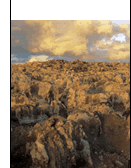

 |
|||
|
Inside Oberlin A Community Comes Together
Academic communities, by definition, turn to teaching and research to confront ignorance and anxiety. Hence our first Winter Term Institute, “After September 11,” a great example of academic community. The brainchild of T. Scott McMillin, associate professor of English and director of winter term, this month-long colloquium brought together campus experts and outside visitors to talk about issues related to September 11. As Professor McMillin had hoped, this project “engaged us—as a community—in meaningful, even urgent intellectual life and helped us better understand the complexity of significant issues that confront us today.” Throughout January, about 100 students, townspeople, and faculty and staff members gathered every Monday through Thursday at noon to hear faculty and visitors deliver a rich variety of presentations. Topics included “Questions of Authority and Islam” by Anna Gade (religion), “Pearl Harbor, Transformation, and the End of Irony: 9/11 and the Media” by Pat Day (English), “Borrowed Time: America, Oil Production, and the Middle East” by Bruce Simonson (geology), “Transformation(s): Process and Personal Ritual in Times of Crisis,” by Johnny Coleman (art), and “Central Asia After the War: Chances for Development, Security, and Human Rights” by Ambassador Steven R. Mann ’73. I was pleased to share a session with Ron Kahn (politics). He addressed military tribunals, while I offered my thinking on “Civil Liberties and Academic Freedom: The War on Terrorism’s Implications for Students and Faculties in American Colleges and Universities.” This first Winter Term Institute reminded me that much is good about life in an academic community, which is characterized first by people coming together to share and deepen their learning. As Professor McMillin put it, Oberlinians “have a tendency to retreat (or escape) in January. But I also believe that winter term presents a magnificent opportunity to do something different, something more…we came together to engage a complex subject from diverse perspectives and to offer a chance for our community to communicate, teach, and learn. We made an escape from escape, a retreat from retreat, turning to each other and to numerous facets—political, philosophical,representational, religious, historical, spiritual, geological, artistic—of our world today. I am very proud of our community for this resistance to turn away, for this honorable affirmation of curiosity, concern, and ‘turning-to.’” Nancy
S. Dye |
|
back to top |
 June
is quite possibly the quietest month at Oberlin, and as such, it
is a good time to reflect upon the academic year just past. It does
not surprise me that my mind has turned, yet again, to the terrorist
attacks of September 11 and the ways in which they have deeply affected
this campus community. During the last eight months, all of us have
had to confront our anxieties and our own ignorance about much of
the world. Our understanding about how the world works has been
shattered, and we are still picking up the pieces. We are living—and
clearly will live for some time to come—in an exceptionally
difficult and anxious time.
June
is quite possibly the quietest month at Oberlin, and as such, it
is a good time to reflect upon the academic year just past. It does
not surprise me that my mind has turned, yet again, to the terrorist
attacks of September 11 and the ways in which they have deeply affected
this campus community. During the last eight months, all of us have
had to confront our anxieties and our own ignorance about much of
the world. Our understanding about how the world works has been
shattered, and we are still picking up the pieces. We are living—and
clearly will live for some time to come—in an exceptionally
difficult and anxious time.